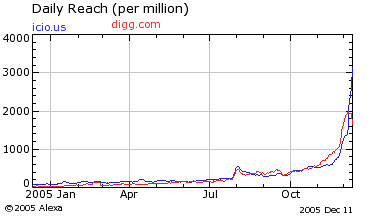Delicious and Digg
You can probably guess from the content here that this post has been sitting in my drafts folder for a long time. :-)
Yes! Yahoo has acquired Flickr's sibling company del.icio.us (which you may have noticed, is now accessible using the Delicious.com domain as well). We're whooping it up on the inside, from which vantage point watching the evolution of Yahoo is the most fun.
People have been discussing the parallel plots of Digg and Delicious, including my pal Marc on the O'Reilly Radar blog. He posted this map from Alexa, which, after the Yahoo announcement has put Delicious up in the peaks. But prior to the announcement they were neck-and-neck. I've been watching this too, having some interest in it myself.
Delicious is designed to be completely about the links. You can add text if you want, but most people don't: they just save the link, giving it their implicit "vote" or "seal of approval". Their "popular" links on the right side of the page is a look into their database. Digg, on the other hand, is explicitly designed to promote a link, and the links that are Dugg float to the front page. The author provides a title and description and the links with merit, having been Dugg by various Diggers, it rises to the top -- and some of this has to do with how well the user "sold" the link, i.e., did they write an attention grabbing headline and description?
I like Digg, not least because they have a beautiful UI, with the lovely "124 Diggs" in the big square box, a UI innovation I've seen replicated on bunches of sites, including Flock. My question is how long Digg can sustain the quality. Watching Slashdot and Metafilter, two similar sites whose members contribute links and descriptions, and sustain comments, it seems as if there is a sweet spot where the # of contributors vs. # of commenters are maximizing quality. And there seems to be a hazard with attention inciting inanity -- people write comments on Slashdot just to say stuff like "It looks stupid, I'm not even going to try it" just to get their name or POV up there, and these tend to take over after a while, as the thoughtful contributors move elsewhere. Individual blogs tend to maintain quality, especially in comments, as there is one benevolent dictator to keep the rabble in line. In some respects, a community site such as Digg's real value will come from the ferocious defense of quality, the weeding out of "It looks stupid" comments and relentless suppression of spam.

<< Home